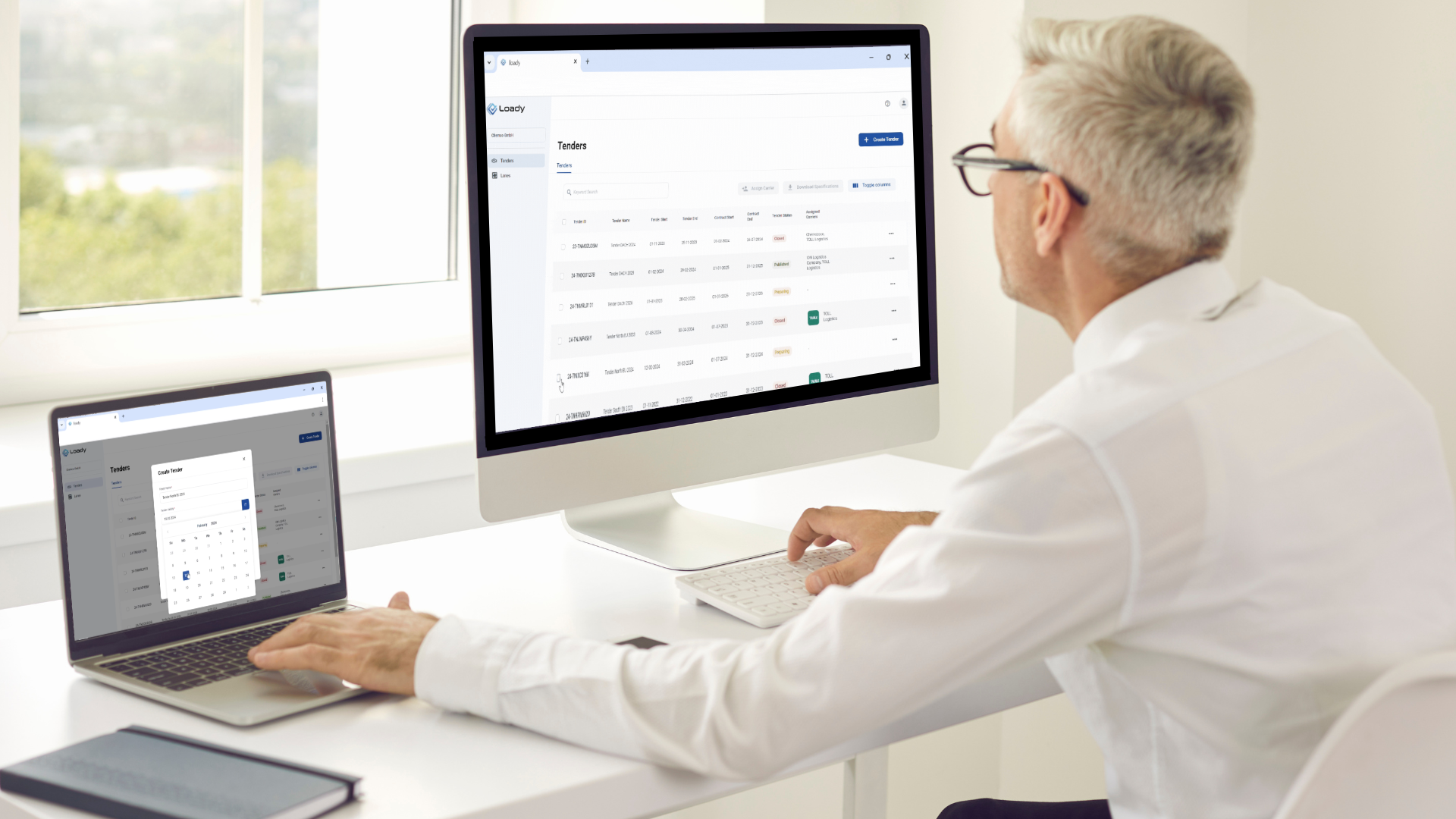Use cases
Cost efficiency in supply chain logistics, from freight procurement to delivery.
See how the industry and their logistics partners benefit.
Supply chain & logistics management
- More productivity and asset effectiveness
- Better planning reliability
- Less troubleshooting
- Important cost savings
- Satisfied customers & employees
Site logistics, security & truck execution
The truck execution process speeds up: less incidents & truck rejections. With Loady, the drivers have clear information on safety, security, opening & delivery hours, technical specifications, etc.
Get started nowCustomer service & sales
Less incidents and reliable transport services impact directly on customer satisfaction reducing complaints and unexpected situations. Even when delivering a customer for the first time or when exchanging the carrier.
Get started with LoadyOperations & production management
Seamless (un-)loading and less incidents in transportation increase the planning security and material flow of your produced goods. Additionally, clear instructions help drivers to perform well, where they are supposed to load autonomously.
Get started with LoadyQuality management
Loady ensures that logistics requirements are digitally available. Carriers and drivers can access the data online at any time via Loady2Go and Loady2Share, incl. the correponding instructions or SDS.
Get started with LoadyTransport planning
Transport management can be so easy: by directly sharing product- and location-specific requirements with carriers, Loady enables real collaboration, reduces incidents and troubleshooting.
Get started with LoadyRaw materials procurement
Your supplier needs all the necessary information for optimal planning and execution of the transport. Sharing your requirements via Loady ensures you that the ordered goods are delivered safely to your location.
Get started with LoadyFreight procurement
Freight tenders with just a few clicks reduce your time in procurement preparation to a few days or even hours. While reducing your efforts and costs, your flexibility increases significantly.
Get started with LoadyProduction & unloading points (inbound)
Smooth unloading at your sites means less troubleshooting and lowers the risk of shortages. With Loady, even new suppliers or new carriers or drivers will know how to manage themselves at you facilities.
Get started with LoadyUse cases - freight forwarders
Getting your customers’ logistics requirements at first hand ensures smarter processes at your side. Your service offering process is speeding up, so do the matchmaking and disposition. You can maintain your subontractors and drivers directly in the information loop. Your transport service quality increases, even while saving costs in double-checking and troubleshooting. The result: better planning capability, less waiting times, less incidents and happy customers.
Dispatching
- Better understanding of logistics requirements
- Loady2Share, free links provided by your customers, minimize cross-checking efforts
- Faster coordination of trucks and equipment
- Centralized data base and ePLR-check
Subcontractor management
Effective communication of requirements and relevant information for product deliveries - even across own company boundaries
Start your trialOffers & tenders
- Speeding up tender processing & freight service offering
- Reducing efforts in double-checking
- More competitive positionning
Transport management
- Simplifying transport planning and organization
- less doube-checking and troubleshooting
- All you need to know about required documents, equipments, opening hours, etc.
Truck drivers
- Mobile view Loady2Go simplifies understanding and makes data available everywhere .
- Less truck rejections
- Less waiting times
Logistics digitalization
- Reliable master data via Loady API
- Using data in the ERP, TMS, your matchmaking tools or in your onboard unit / telematik application for a clear communication with truck drivers








The data standard for high quality supply chain logistics

Verlader
Optimiere deinen Logistikprozess, vom Frachteinkauf und Frachtauftrag, über die Transportplanung und Disposition, bis hin zum Transport selbst.
Speditionen
Mit Loady die Zufriedenheit der LKW-Fahrer steigern, aber auch Kosten, Leer- und Extrakilometer – und somit CO2 Emissionen – einsparen.

Standortlogistik, Werksschutz und LKW-Abfertigung
Reibungslose Abläufe sicherstellen ist leicht, wenn Sicherheitsvorschriften, Öffnungs- und Lieferzeiten, Abläufe und Anweisungen vor Ort verständlich und aktuell kommuniziert werden.

Supply Chain Management & Logistikleitung
Kosteneinsparungen entlang des kompletten Logistikprozesses, effiziente Abläufe und eine optimale Auslastung. Keine Ladeslots mehr verlieren. Wie das geht?

Kundendienst und Vertrieb
Zuverlässige Warenlieferungen, bei denen es keine Zwischenfälle gibt, steigern die Kundenzufriedenheit.
Das bedeutet auch weniger Beschwerden und Reklamationen.

Betriebs- und Produktionsleitung
Wenn produzierte Ware zuverlässig abgeholt und bestellte Materialien reibungslos angeliefert werden, steigert das die Effizienz und Planungssicherheit.

Qualitätsmanagement
Die Qualität eines Produkts nachzuweisen und sie entlang der Lieferkette sicherzustellen erfordert, dass qualitätsrelevante Daten und Dokumente digital verfügbar sind. Mit Loady können diese jederzeit online eingesehen werden, auch während des Transports.

Transportplanung
Produkt- und standortspezifische Anforderungen aus Loady können einfach mit Logistikdienstleistern geteilt werden. Diese werden über die Zuweisung von Transport Lanes auf die jeweiligen Datensätze freigeschalten und können sie wiederum zur Disposition und für die Kommunikation mit ihren Subspeditionen und Fahrern nutzen.

Rohstoffeinkauf
Gute Konditionen beinhalten immer auch eine gute Anlieferung der bestellten Waren. Zur Planung und Organisation des Transports benötigt dein Lieferant genaue Informationen.

Frachteinkauf
Anforderungen für Frachtausschreibungen einfach per Mausklick? Mit Loady gehören monatelange Vorbereitungen und langwierige Datenverifizierungen endgültig der Vergangenheit an.

Produktion und Entladestelle (Inbound)
Reibungsloses Be- und Entladen – selbst wenn der Fahrer zum ersten Mal vor Ort ist? Mit Loady weiß er genau, was er mitzubringen hat und wie die Abläufe sind. Das reduziert Warte- und Stillstandzeiten und erhöht die Planungssicherheit.

Digitalisierung Logistik
Loady liefert einen fundamentalen Baustein für die Digitalisierung der Logistik. Denn operative Logistikanwendungen benötigen valide Stammdaten: Frachteinkaufsplattformen, Transport- und Yard Management Systeme sind nur einige davon.
Daten aus Loady bringen Klarheit und ein einheitliches Verständnis in die Logistik.
Das bedeutet reibungslose Abläufe und Kosteneffizienz, vom Frachteinkauf bis zur Transport.
Nutzen entlang des End-to-End Logistikprozesses im Unternehmen
Zuverlässige Transporte
Kosten einsparen
Planungssicherheit
Stop mit Troubleshooting

Supply Chain Management
Wenn Prozesse reibungsloser ineinandergreifen und die Transparenz steigt, wird Logistik planbarer und zuverlässiger.
- Weniger Wartezeiten
- Weniger Troubleshooting
- Weniger verlorene Ladeslots
- Steigerung der Produktivität
Loady ermöglicht eine insgesamt bessere Nutzung und Auslastung der vorhandenen Ressourcen. Die KPIs im Supply Chain Management verbessern sich, denn gerade an den kritischen Schnittstellen mit den Logistikpartnern klappt es jetzt ohne Zwischenfälle.
Verlässliche Stammdaten sind die Grundlage für die weiterführende Digitalisierung der Logistikprozesse im Unternehmen. Ob im bisher meist Excel-basierten Frachteneinkauf, im Frachtauftragswesen, im Rohstoffeinkauf oder in der Standortlogistik. Indem die Daten aus Loady in Unternehmenssysteme und mit externen Lösungsanbietern integriert werden können, sind sie überall da, wo die Nutzenden sie im Logistikprozess benötigen. Immer aktuell und verbindlich.
Loady optimiert die komplette Transportlogistik, egal ob verpackte oder lose Ware. Daten aus Loady sind von hoher Relevanz für die In- und Outbound-Logistik.
Standortlogistik
Sicherheitsvorschriften, Öffnungszeiten, Prozesse zur LKW-Abfertigung, aber auch die einzelnen Gebäude und Ladestellen können ab jetzt direkt in Loady gepflegt und mit Geschäftspartnern und Logistikdienstleistern geteilt werden. Die Daten aus Loady können dann direkt in Checklisten verwendet werden – eine grundlegende Voraussetzung für die Automatisierung von Abfertigungsprozessen am Tor.
Kundendienst
Anforderungen der Kunden müssen ab jetzt nicht mehr einzeln in den Unternehmenssystemen nachgehalten werden. Die bisherigen “G14-Freitexte” (SAP User wissen, wovon wir sprechen…) erhalten ihre Informationen jetzt direkt aus Loady und werden vom Kunden selbst dort aktuell gehalten.
Betriebsleitung und Ladestelle (Outbound)
Eine optimale Transportplanung und auch die Feinplanung der Slots an den Ladestellen erfordert zuverlässige Ladeanforderungen. Hier kommt es auf die Infrastruktur und lokalen Gegebenheiten vor Ort aber – gerade bei Gefahrstoffen oder besonderen Verpackungen – auch auf die produktspezifischen Eigenschaften an. In Loady werden diese miteinander gematcht, so dass Sonderregelungen direkt ins Auge springen und beachtet werden können.
Qualitätsmanagement
Produktqualität zu gewährleisten ist gerade an den Umladestellen eine Herausforderung. Mit Loady werden nicht nur relevante Produktdokumente handhabbar, auch Vorladerestriktionen und Reinigungsanforderungen können gemanaget und mit den Spediteuren direkt geteilt werden.
Transportplanung
Produkt- und standortspezifische Anforderungen aus Loady können einfach mit Logistikdienstleistern geteilt werden. Diese werden über die Zuweisung von Transport Lanes auf die jeweiligen Datensätze freigeschalten und können sie wiederum zur Disposition und für die Kommunikation mit ihren Subspeditionen und Fahrern nutzen.
Rohstoffeinkauf
Eingekaufte Produkte müssen geliefert werden. Damit es hier keine Zwischenfälle und unnötigen Diskussionen gibt, teilt man den Lieferanten am besten direkt mit, wo sie auf die aktuellen Entladeanforderungen zugreifen können und schaltet sie dafür frei. So ist vom ersten Moment an sicher gestellt, dass alle lieferrelavanten Informationen bekannt und verfügbar sind.
Frachteinkauf
Was für einzelne “Spot” Frachtaufträge gilt, gilt für komplexe Frachtausschreibungen erst recht: Damit eine Spedition ein passendes Angebot machen und dann auch den Transport zuverlässig ausführen kann, braucht sie alle vertragsrelevanten Informationen und Anforderungen. Am besten aus erster Hand – und in verständlichen Formaten. Loady als “Single Source of Truth” für alle Logistikpartner stellt diese Daten – auf dem neuesten Stand und mit Änderungshistorie – digital bereit.
Produktion und Entladestelle (Inbound)
Die Planung an den Entladestellen und rechtzeitige Verfügbarkeit der bestellten Rohstoffe und Materialien ist für die Produktion und Produktivität im Betrieb von ausschlaggebender Relevanz. Am Einfachsten ist es, die vor Ort und für das zu liefernde Produkt geltenden Anforderungen direkt über Loady mit dem Lieferanten zu teilen. So kann dieser auch den passenden Transportservice einkaufen, seinen Spediteur auf die Daten freischalten und eine hohe Lieferqualität sicherstellen.
Digitalisierung Logistik
Verlässliche Stammdaten sind ein Erfolgsfaktor für die weiterführende Digitalisierung in der Logistik. Eine interoperable Plattform wie Loady emöglicht, zentral gepflegte Be- und Entladeanforderungen sicher über API-Schnittstellen in Systeme und Prozesse zu integrieren. Von der Bestellung im ERP über das Transport Management System bis hin zu Einkaufs- und Versteigerungsplattformen, Yard Management Systemen und anderen operativen Anwendungen. User müssen keine Doppelpflege mehr betreiben und der Datenabgleich entfällt.

BASF Logistik GmbH
